The scholarly debate over Shakespeare and his family, especially with respect to their Catholic sympathies, remains a hot topic. For those who don’t share these sympathies, or are positively antagonistic to them, the evidence that Shakespeare was a believing Catholic is unwelcome and, for some, simply unacceptable.
 The recent claim by Matthew Steggle, writing in the Shakespeare Quarterly, that “John Shakespeare’s ‘Spiritual Testament’ Is Not John Shakespeare’s” is the latest controversy surrounding the evidence that Shakespeare and his family were Catholics. John Shakespeare, the poet’s father, had signed an avowedly Catholic document, which was subsequently hidden in the rafters of his house, presumably for fear of its discovery during a time of relentless persecution of England’s Catholics. Although it is clearly signed by “John Shakespeare”, Professor Steggle suggests that it was actually signed by Joan Shakespeare, John’s daughter and the poet’s sister. In my response to his arguments, published last week in The Imaginative Conservative, I conclude that his reasoning is flawed and that the evidence still indicates that the poet’s father, not his sister, had signed the document.
The recent claim by Matthew Steggle, writing in the Shakespeare Quarterly, that “John Shakespeare’s ‘Spiritual Testament’ Is Not John Shakespeare’s” is the latest controversy surrounding the evidence that Shakespeare and his family were Catholics. John Shakespeare, the poet’s father, had signed an avowedly Catholic document, which was subsequently hidden in the rafters of his house, presumably for fear of its discovery during a time of relentless persecution of England’s Catholics. Although it is clearly signed by “John Shakespeare”, Professor Steggle suggests that it was actually signed by Joan Shakespeare, John’s daughter and the poet’s sister. In my response to his arguments, published last week in The Imaginative Conservative, I conclude that his reasoning is flawed and that the evidence still indicates that the poet’s father, not his sister, had signed the document.
The scholarly debate over Shakespeare and his family, especially with respect to their Catholic sympathies, remains a hot topic. For those who don’t share these sympathies, or are positively antagonistic to them, the evidence that Shakespeare was a believing Catholic is unwelcome and, for some, simply unacceptable. For some scholars, and I’m not necessarily placing Professor Skeggle in this camp, it is necessary to rescue the Bard of Avon from the Church of Rome.
This scholarly dispute over Shakespeare’s faith is not merely academic, in the pejorative sense that it doesn’t really matter; on the contrary, it matters a great deal. If Shakespeare was a Catholic, he was a member of a persecuted minority and was writing as a member of a persecuted minority. Catholics were being executed, exiled, imprisoned and fined during the years that Shakespeare was writing his plays. This matters. It matters so much that it must be denied by those who want Shakespeare to an atheist, a nihilist, or a hedonistic homosexual; or, indeed, for anyone who wants Shakespeare to be anything but a Catholic. The problem is that the evidence for the Bard’s Catholicism is so abundant that it can be said to be proven beyond any reasonable doubt.
Although it is not possible to present the evidence for Shakespeare’s Catholicism adequately in a brief essay, a few salient facts from his life will serve as a rudimentary introduction to the whole issue. Those wishing to dig deeper might want to begin with my books, The Quest for Shakespeare: The Bard of Avon and the Church of Rome, which gives the biographical and historical evidence, and Through Shakespeare’s Eyes: Seeing the Catholic Presence in the Plays, which gives the textual evidence. At the conclusion of the former book, I offer a five-page selected bibliography in which seventy-six books are listed for further reading.
Here are a few facts from Shakespeare’s life which should prove beyond any reasonable doubt that he remained a Catholic.
Shakespeare was raised in a devout Catholic family. Those on his mother’s side were especially militant in their refusal to abandon the Catholic faith for the state religion, suffering greatly in consequence. Less is known of the paternal side of the family but John Shakespeare was fined for his Catholic recusancy (his refusal to conform to the state religion) in 1592. Nor was Shakespeare’s family an isolated exception. Many, possibly most, of the people living in and around Stratford-upon-Avon remained Catholic, at least in sympathy, during the years of Shakespeare’s childhood and youth, and many were as defiant in their determination to retain their faith.
Although most scholars have accepted, albeit reluctantly in many cases, that Shakespeare was raised in a Catholic family, they argue that Shakespeare lost his faith after he arrived in London and began writing his plays. A look at some of the facts will show that they are wrong.
In 1596, Shakespeare was accused in court of threatening violence against two people who were known persecutors of Catholics, one of whom had boasted in writing of his role in the raiding of Catholic homes. One of Shakespeare’s co-defendants was Anne Lee, wife of the Catholic recusant Roger Lee, whose house had hidden many priests. Anne had herself been accused a year earlier of attending a secret Mass and of assisting the Jesuit, John Gerard, to hide from the authorities. Anne would later be executed for her role in hiding priests. Intriguingly, she and her husband were probably the inspiration for Shakespeare’s enigmatically cryptic poem, “The Phoenix and the Turtle”.
In March 1613, Shakespeare purchased the Blackfriars Gatehouse in London, which had long been a haven for priests and which had been raided on more than one occasion by the authorities. He leased the Gatehouse to John Robinson, a Catholic recusant whose brother, Edward, had entered the English College in Rome to become a priest. It is clear, therefore, that Shakespeare expected the house he had purchased to continue to be used as a safehouse for priests.
These few facts offer a foretaste of what is to be discovered by those wishing to know more about the fascinating life of England’s greatest poet. Much more could be said and much more has been said. For now, we’ll conclude with the words of the dying Hamlet, who asks his friend Horatio to reveal the hidden facts of his life and the justice of his cause to those who are ignorant:
Horatio, I am dead:
Thou livest; report me and my cause aright
To the unsatisfied.
May Shakespeare have his life recorded truly and his cause reported aright. May those who are arrogant in their ignorance be refuted and may the seekers after truth be satisfied.
The Imaginative Conservative applies the principle of appreciation to the discussion of culture and politics—we approach dialogue with magnanimity rather than with mere civility. Will you help us remain a refreshing oasis in the increasingly contentious arena of modern discourse? Please consider donating now.
The featured image is an illustration of William Shakespeare reciting his play Hamlet to his family (circa 1890), and is in the public domain, courtesy of Wikimedia Commons.


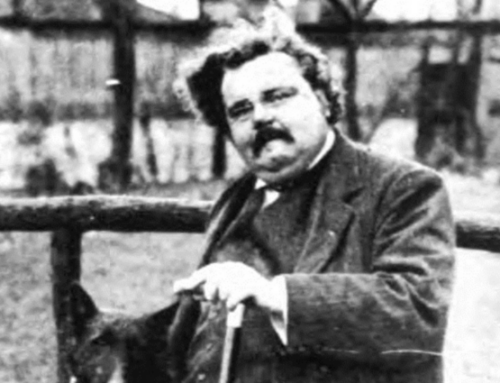
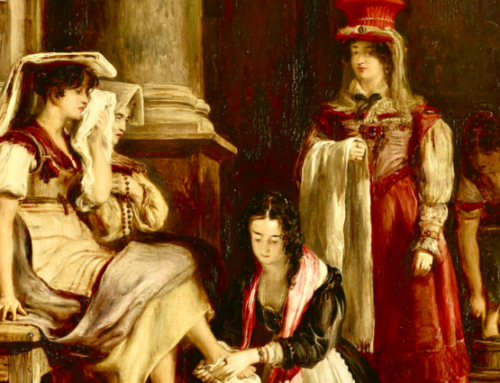
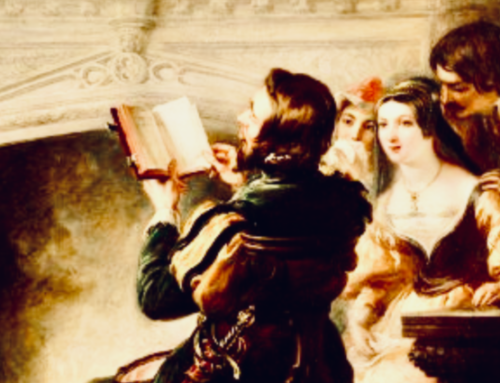
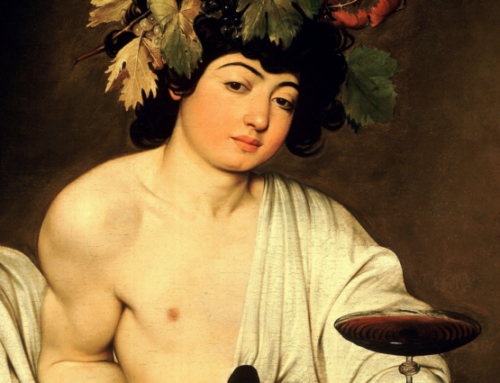
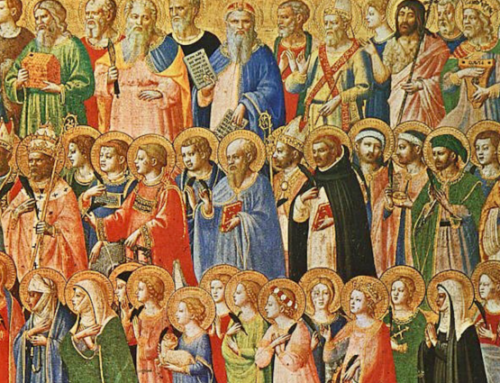
With the reference to Saint Patrick, “Yes but there is, Horatio, and much offense, too.”, in Act 1, scene 5 of Hamlet, Shakespeare provides irrefutable evidence of his message to the faithful in England. He was reminding them of the tenets of their Faith: Apostolic Authority, the sacraments, and the Real Presence.
The playwright purposefully directs the reader to Saint Patrick and thus to his works, Confessio and Epistola. Epistola is Patrick’s letter to Coroticus, a British chieftain, condemning him for having raided the coast of Ireland and having captured, murdered, and sold into slavery newly baptized Christians. Patrick accuses certain British clergy of flattering and sitting at table with Coroticus, partaking of his “poisoned” food. Patrick’s intent is that his letter be read before Coroticus, his collaborators, and all the people. The parallels between Saint Patrick’s works and Hamlet make clear that the play is an allegory against Henry VIII’s break with Rome. The allegorical offense in the play mirrors the actual offense in Epistola; both are offenses against Christianity.
The full genius of the play was that only those who had read Epistola would know unambiguously what message the playwright intended Veiled enough to have prevented a charge of treason, the playwright’s message was essentially that of the Counter-Reformation: defend the Faith, reform the Church, and prevent the spread of heresy. In my book HAMLET In Defense of the Faith I discuss how the parallels between, the allusions to, and the echoes of Confessio, and especially Epistola, deepen and expand the allegory, and in fact make the play make perfect sense. The message matters today as much as it did during the Reformation.
I would like to know if Mr. Pearce has commented anywhere on Lady Asquith’s books; his response, whatever it it may be, would certainly add to the ongoing revelation of Shakespeare’s Catholicism. to a stunned academia.
Once I realized that Shakespeare was indeed Catholic, it added even more poignancy to understanding his plays.